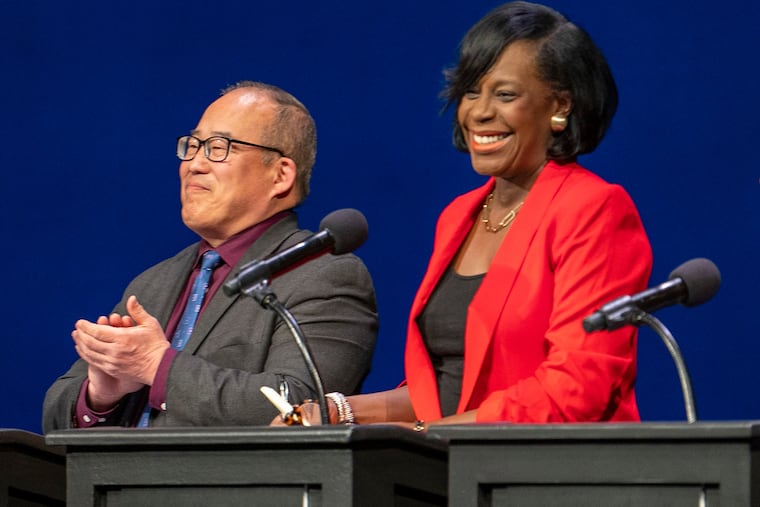Cherelle Parker didn’t ‘defund the police,’ despite GOP opponent David Oh’s attempts to tie her to the movement
The line of attack early in the general election campaign for mayor shows how Oh is attempting to draw a distinction between himself and Parker on a thorny political issue.

In late April, Cherelle Parker stood on a debate stage in the final weeks of the heated Democratic primary campaign for Philadelphia mayor and tried to separate herself on policing, saying that “when others wanted us to lead with slogans like ‘defund the police,’ I introduced a plan that people told me could get me canceled.”
That plan is to add 300 police officers to the force and was a major part of her winning primary campaign.
Now, her Republican opponent running ahead of the November general election is trying to tie her to the very movement she forcefully distanced herself from.
David Oh, a former City Council member who served alongside Parker, has repeatedly said Parker signed a “defund the police letter,” saying in an interview on CNN last week that “a year ago, [Parker] had a very different position.”
But here’s the thing: The Philadelphia Police Department wasn’t defunded, and the letter Oh was referencing didn’t say Council wanted to do so.
The letter to Mayor Jim Kenney — written three years ago, not one — was signed by 14 members of City Council just days after the Minneapolis police killing of George Floyd set off a nationwide racial-justice protest movement. A majority of Council wrote that they opposed the mayor’s plan to increase the police budget by $19 million.
Ultimately, Council canceled the proposed increase, and moved $14 million more in funding for crossing guards and public safety enforcement officers to another department.
Oh said in an interview that his criticism of Parker’s signing of the letter is sound, arguing that the 2020 deal represented “a cut of the proposed amount.”
“At the time, you said, ‘We cut the budget,’ and now you’re saying that it was flat-funded,” Oh said. “Maybe you can, in politics, say two different things at two different times, but you’re going to have to pick one.”
Aren Platt, a senior advisor to Parker, said in a statement that Oh “is simply trying to mislead voters in an attempt to find a foothold in a race where he has been unable to gain any traction.”
“Cherelle Parker never voted to ‘defund the police’ or to cut police funding,” Platt said.
Oh’s line of attack early in the general election campaign for mayor shows how he is attempting to draw a distinction between himself and Parker on a thorny political issue in his long-shot bid for the Mayor’s Office. Democrats outnumber Republicans in the city 7-to-1, and the GOP hasn’t held the top job for 70 years.
» READ MORE: In Philly mayoral primary, candidates distance themselves from 'defund'
Tying Parker to anti-police rhetoric could prove challenging. She ran as a relative moderate in the primary campaign and won by nearly 10 points over the second-place finisher. Parker made law enforcement a key tenet of her message, decrying “lawlessness” on the campaign trail and showing openness to the controversial police tactic known as stop-and-frisk.
Ahead of the May 16 primary, all the Democrats — including those from the city’s more progressive wing — said they would not move to decrease the Police Department’s nearly $800 million budget.
Still, the 2020 vote became an issue. Democrat Jeff Brown, the only major contender who had never held elected office before, on several occasions attacked his opponents over the vote. Brown finished fifth in the primary.
About two-thirds of Philadelphians believe that the city does not have enough police officers, according to a Lenfest Institute for Journalism/SSRS poll released in March. Just 5% of all respondents said the city has too many police.
But the poll showed attitudes are nuanced. While most people agree combating crime should be a top priority for the next mayor, only about half said that increasing police funding is a key way to do so.
» READ MORE: Most Philadelphians think the city needs more cops. They’re split on more money.
Amid a persistent three-year gun violence crisis, crime is a key issue for the vast majority of city residents — more so than in 2020, when thousands of activists flooded Philadelphia streets, with many demanding the police budget be dramatically slashed.
That year, following the canceled increase, the police budget was set at about $727 million. Since then, it has increased significantly, reaching $800 million in the current fiscal year that ends this month.
Kenney’s budget proposal that Council is currently wrangling over includes a $55 million increase — largely to cover forensics upgrades and contractually obligated pay raises — that would bring the police budget for the upcoming year to about $855 million.